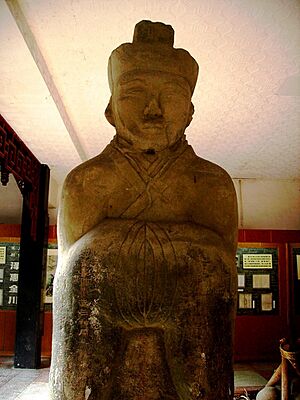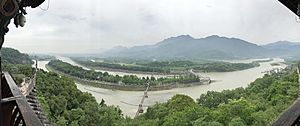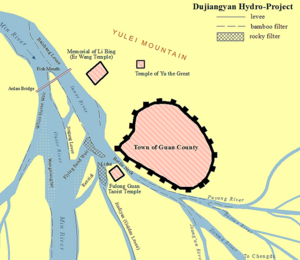Li Bing (Qin) facts for kids

Li Bing (Chinese: 李冰; pinyin: Lǐ Bīng; c. 3rd century BC) was a famous Chinese engineer and government official. He lived during the Warring States period, a time when different states in China were often at war. Li Bing worked for the state of Qin as an administrator, which means he helped manage the government and public projects.
He is especially remembered for his incredible work on the Dujiangyan River Control System. This system was a huge success because it helped stop floods and provided water for farms all year long. This made the land much more productive and helped many people. Li Bing became a hero, known for taming the powerful River God. People even compared him to the legendary Great Yu, who was also famous for controlling floods.
The Dujiangyan system is still used today! It is so important that it is listed as a UNESCO World Heritage Site.
Li Bing's Life and Work
Around 277 BC, King Zhaoxiang of Qin (who ruled from 306–251 BC) sent Li Bing to be a governor in Shu. Shu was a recently conquered state in Sichuan province, which is in Southwest China, near the modern city of Chengdu.
When Li Bing arrived in Shu, he saw that the local people were suffering from frequent floods from the Min River. The Qin government also needed more food and better ways to move supplies for its army.
Building the Dujiangyan System
Li Bing then started what would become one of the biggest and most carefully planned public projects of its time. This project was called Dujiangyan. He carefully studied the Min River to understand how to control its waters. His goal was to stop floods and create a way to bring water to the farms around Chengdu. This new water system also helped the military by making it easier to supply their troops. Qin administrators often designed farming projects that helped both civilians and the army.
The Min River is very long, stretching 735 kilometers. It is the largest and longest river that flows into the Yangtze River.
Taming the River Spirit
The local people in Shu believed that the Min River was a powerful god. Stories say that when Li Bing was in charge, he wanted to stop the old custom of offering brides to the river god. To do this, he used a clever plan that combined smart thinking and a bit of a show.
First, he built a temple to honor the Min River deity. Then, he pretended to offer his own two daughters as brides to the god. He set up a big feast by the river and offered a toast. When the river god (who was, of course, not really there) didn't drink his wine, Li Bing acted very offended. He ran off with a sword, as if to fight the god.
Suddenly, two bulls that had been prepared in advance began fighting by the river bank. This was a symbol of Li Bing fighting the river god. Li Bing returned, looking tired and sweaty as if he had just fought a battle. He called for help, and one of his assistants quickly killed the bull that Li Bing had pointed out as the "river god." This dramatic act made the local people believe that Li Bing had truly defeated the river spirit. After this, the custom of offering brides to the river god stopped.
The workers who built the Dujiangyan system were mostly people who had been sent there from lands conquered by the Qin, along with the local population.
 | William M. Jackson |
 | Juan E. Gilbert |
 | Neil deGrasse Tyson |



